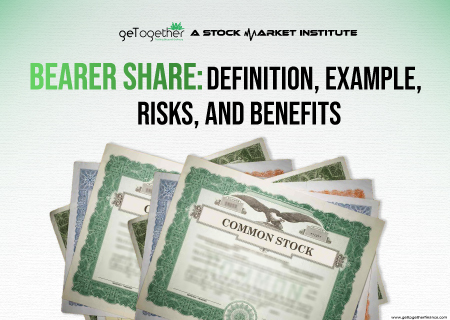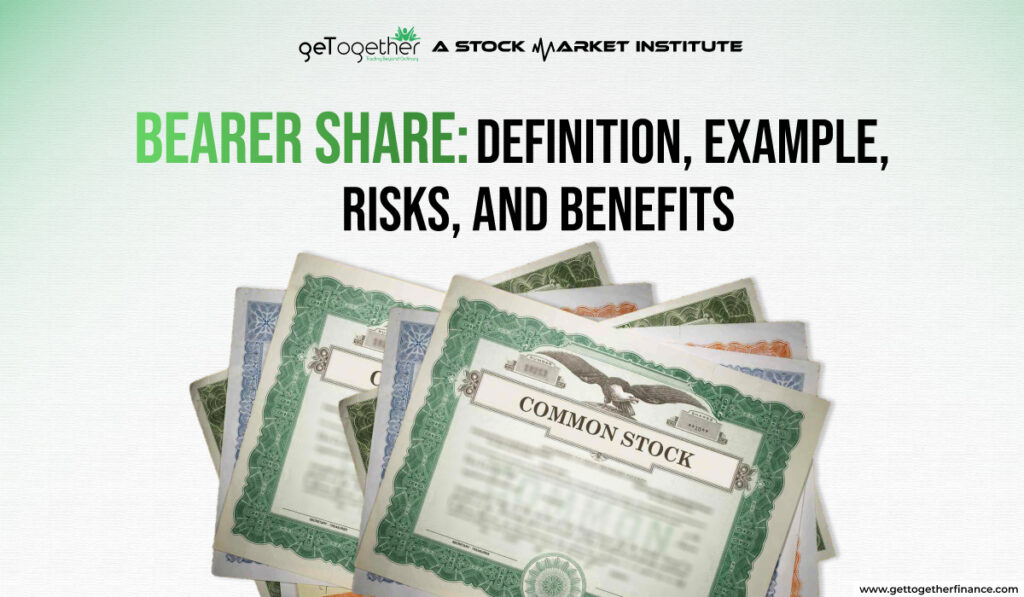Bearer Share: Definition, Example, Risks, and Benefits


Bearer shares are the relic of veteran market investors but hold a good mystery in current market times. These are the unique security instruments where the owner of the share is not registered anywhere with the issuer. The only proof one holds is the physical certificate of the share that is redeemable to the benefits.
These are beneficial for both the company and the owner of the shares. Both the company and the shareowner do not want them to be registered and enjoy the benefits of the share in a discrete way. Though, as intriguing as it sounds it has its own share of drawbacks. In this blog, we’ll look into everything related to bearer shares.
What are Bearer Shares?
Bearer shares are a type of stock or equity ownership where the physical share certificate is given to the owner. It is not registered in any name, just proof of having a certificate made to the legitimate owner. Bearer share are not issued under the supervision of a higher authority. They are simply issued in physical certificate form to validate the owner and give them its benefits when they show it physically. No record is mentioned in the books of the company on the issuance of bearer share.
The company is entitled to give dividends to shareholders when the physical coupon or the certificate is presented to them by the owner.
Since there is no security authority involved, they lack transparency. The majority of people buy it to convert their cash into liquid assets. It helps them get fixed income regularly in the name of dividends without highlighting themselves in legal books.
Benefits of Bearer Shares
In India, bearer shares are not as popular as in Western Europe and America. Wealthy people in these countries have utilized bearer shares to protect their assets and convert cash into liquid assets. However, this has impacted government policies severely. Investors were accused of dwindling government policies with anonymous illegal activities.
Anonymity: The foremost and only good benefit of a bearer share is having a private yet strong source of income. This is the reason many governments and corporations repel the idea of bearer share and have considered it illegal. The highest level of anonymity for the owner is maintained since there is no track record of it.
REMEMBER: The shares are issued through the banks, but in no case, banks are obligated to or can be forced to disclose the identity of the shareowner to any person or legal entity. This way, the bearer share comes as a rescue for the people who don’t want to get in legal trouble for their assets. They try to keep them discreet with the physical share certificates.
Easy to Transfer: Another great advantage that bearer shares hold is the ease of transfer. They can simply be transferred by handing over the certificate to the other person. Keeping the anonymity top-notch yet making sure the money is transferred. This streamlined and easy process reduces the transaction cost and the involvement of administrative authorities.
Minimize Tax Liability: When your assets are hidden from the government, automatically you get a lease in the tax. The tax liabilities reduce with the reduced assets.
Useful in International Transactions: Bearer shares are used in international transactions. They are easy to transfer for transactions with higher amounts. The complex transfer and registration process need is eliminated with bearer share. Followingly the jurisdictions with capital control and tax implications can be easily dodged.
While these advantages may appeal to certain investors and businesses, it is critical to recognize that bearer share also involve considerable dangers, particularly in terms of transparency, compliance, and potential for criminal use. As a result, considerable deliberation and thorough diligence are required before selecting for bearer share arrangements.
Risks of Bearer Shares

As studied earlier, Bearer shares have their own share of risks and rewards. But, surely the share of risks is higher than the rewards.
Cost of anonymity: As easy as it sounds to buy shares anonymously, it is equally expensive. The owner needs to hire professionals to maintain their anonymity during the buying procedure without involving any legal trouble.
Tough to Buy: Considering the changing world and increased corruption, terrorism, money laundering cases, and other fraudulent activities, having anonymous shares is getting difficult. Many jurisdictions and the government strictly condemn the buying of bearer share.
Threat of Theft: As much as ease of transfer serves as a benefit, it is equally threatening. Since shares are only available in physical form, they can be easily stolen. Nothing can be done if the physical certificate gets in the wrong hands. As soon as you lose the physical certificate of our coupon, you lose ownership.
Tax Evasion Risks: When you conceal your assets from the government you become their target accused of tax evasion and money laundering. Keeping all the procedures lowkey is quite difficult.
Getting Financial Benefits from Banks is Difficult: Banks usually refrain from giving financial assistance to the entities that offer bearer share. The reason is there is no legal proof of its owners, and the ownership is easily transferable which becomes questioning for the bank.
Examples of Bearer Shares

There are various scandals that have taken place in the name of bearer shares, here are some famous ones that came into the spotlight:
- Luxembourg
Earlier in Luxembourg the jurisdiction was favorable for bearer share. The financial services industry was at ease with these jurisdictions and many people are able to keep their money out of the government’s eyes with this. But, with increased fraudulent activities and rising inflation, the jurisdiction and tax regimes were forced to change. Though it attracted international funding, Luxembourg has now reformed policies to have reliable international investments with increased transparency.
- Switzerland
Currently known as a good and strong economy, once had the jurisdiction to hide assets in the name of bearer share. The country has secrecy in banking laws and owner-friendly tax policies. This attracted companies from around the globe to Switzerland. In no time it became a go-to destination for offshore companies for adjusting their wealth. Swiss corporations offered anonymity and flexibility in wealth management in the name of bearer share. However, in recent years, Switzerland has implemented measures to enhance financial transparency and combat money laundering, leading to restrictions on bearer share.
- Volkswagen Ag
Earlier, Volkswagen, one of the world’s well-known automobile manufacturers, issued bearer shares. Bearer shares of Volkswagen were traded on stock exchanges too. It gave investors anonymity and simplicity of transfer. However, in 2008, Volkswagen converted all of its bearer share to registered shares to comply with new German legislation aimed at boosting transparency and shareholder rights.
- Credit Suisse Group AG
It is a Swiss global investment bank and financial services firm, is another company that has earlier issued bearer shares. Credit Suisse’s bearer shares provided investors with confidentiality and autonomy in managing their investments. Credit Suisse, like many other Swiss banks, has phased out bearer shares as a result of legal changes and global efforts to combat financial crime.
Conclusion
In conclusion, bearer shares, which were formerly popular among investors seeking anonymity and flexibility, have become increasingly rare as a result of legal changes and global efforts to improve transparency and combat financial crime. While bearer shares have advantages such as anonymity, ease of transfer, and potential tax benefits, the hazards connected with them, such as lack of transparency, susceptibility to fraud and theft, and regulatory scrutiny, often exceed the benefits. Recent instances from Luxembourg, Switzerland, and firms such as Volkswagen and Credit Suisse demonstrate the changing landscape of bearer shares. As investors and businesses manage the intricacies of modern finance, it is critical to carefully analyse the benefits and dangers before considering alternative investment options that prioritize transparency, compliance, and long-term sustainability.
FAQ
What are bearer shares?
Bearer shares are unregistered equity securities whose ownership is defined by the physical possession of the share in the form certificate. The holder of the physical share certificate is deemed the owner of the shares and enjoys the rights that come with them.
How do bearer shares differ from regular shares?
Bearer shares have no registered owners; ownership is transferred by transferring the physical share certificate. In contrast, conventional shares are registered in the shareholder’s name with the company’s registrar, and ownership changes are documented.
Why would someone choose bearer shares?
Bearer shares provide anonymity and privacy because ownership is not recorded in public registries. They offer the flexibility of transferring ownership without the requirement for formal documents, making them appealing for confidentiality purposes in certain jurisdictions.
Are bearer shares legal?
Bearer shares are permitted in some jurisdictions, but they have been restricted or banned in many others due to concerns about money laundering, tax fraud, and a lack of transparency regarding ownership.
How do I buy bearer shares?
Bearer shares can be acquired through brokers or in private transactions. Upon purchase, buyers often receive tangible share certificates that indicate ownership rights.
Can bearer shares be stolen?
Bearer shares, like any other physical asset, are susceptible to theft. Their anonymity and lack of ownership registration make them vulnerable to theft, loss, or misuse if not properly safeguarded.
Do bearer shares help with taxes?
Bearer shares may provide tax benefits in places with lax tax laws, as ownership might be difficult to identify. However, the tax ramifications differ based on the individual’s tax residency and the regulations of the nation.
Can I get a loan using bearer shares as collateral?
Borrowers can use bearer shares as collateral for loans, depending on the lender’s requirements. However, lenders may request further due diligence to offset the risks connected with bearer shares’ anonymity.
What risks come with owning bearer shares?
Risks include the loss or theft of physical share certificates, the difficulty of proving ownership, a lack of shareholder rights protection, and potential legal or regulatory issues, particularly in areas with bearer share prohibitions.
Are bearer shares still commonly used today?
Bearer shares’ popularity has dropped as a result of greater regulatory scrutiny and measures to combat financial wrongdoing. Many countries have eliminated or restricted their use in favor of registered shares in order to increase transparency and avoid illegal activity.



 Instagram
Instagram 
